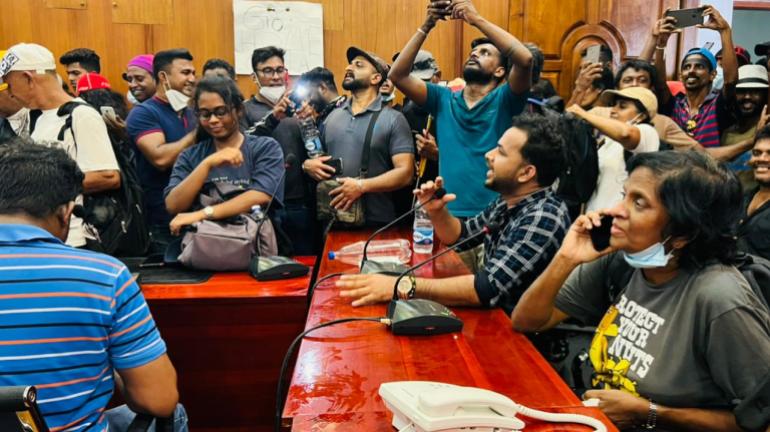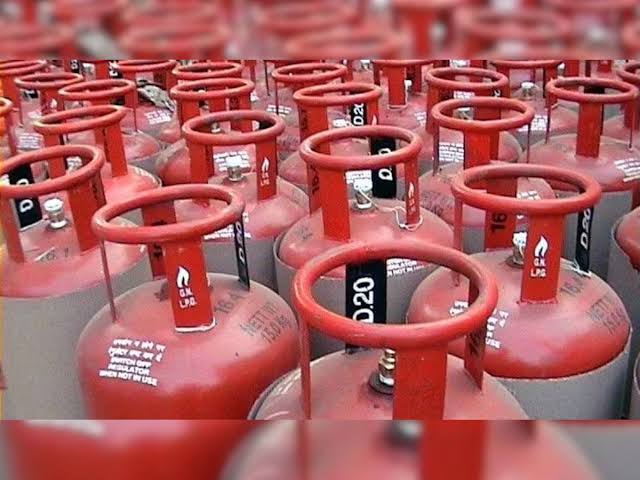Protesters say no to an all-party government being discussed by politicians, saying it will be a way for the ‘Rajapaksa cartel’ to remain in power.
Colombo, Sri Lanka – Tens of thousands of Sri Lankan protesters have been occupying the President’s House, the presidential secretariat and the prime minister’s official residence in growing anger over the island nation’s unprecedented economic crisis.
The chaos began on Saturday when angry Sri Lankans stormed the official residence of President Gotabaya Rajapaksa, a 73-year-old member of the powerful Rajapaksa clan whom protesters blame for the country’s worst economic crisis since 1948.
Rajapaksa is expected to officially resign on Wednesday. Prime Minister Ranil Wickremesinghe has also offered to quit once an interim all-party government being discussed among the political parties to resolve the crisis is formed.
However, protesters have rejected an all-party government and said they will not vacate the government buildings until the president and the prime minister officially resign.
What do the protesters want?
“We are asking for the immediate resignation of Gotabaya Rajapaksa and Ranil Wickremesinghe. Following that, an interim government need to be in place for at least six months,” Shabeer Mohamed, 22, told Al Jazeera.
“We are against an all-party government,” he added.
Most protesters do not want the Sri Lanka Podujana Party (SLPP) controlled by the Rajapaksas to be a part of an all-party government.
Melani Gunathilake, 35, said the protest leaders strongly oppose an all-party government, a move in her view for the “Rajapaksa cartel” to control the government from behind the scenes.
“Our request is for an interim government, not an all-party government,” she told Al Jazeera.

An Action Plan released by the protesters on July 5 lays out six key demands, including the formation of a People’s Council from the members of “Janatha Aragalaya” (People’s Struggle) that oversees the political transition in the country.
Six main demands of the protest leaders:
- President Gotabaya Rajapaksha should immediately resign
- PM Ranil Wickremesinghe and his government should also quit immediately
- An interim government should be established for a maximum period of one year
- A new constitution that endorses people’s sovereignty be established through a referendum, hopefully within a year
- President’s executive powers should be reduced and democratic institutions strengthened until the new constitution is drafted
- The fundamental objective of the interim government should be to implement the above proposals
While there is no leadership structure or a single organisation representing the mostly young protesters, the Inter University Student Union, widely regarded as the student wing of the left-wing Frontline Socialist Party, and the Socialist Youth Union affiliated to Janatha Vimukthi Peramuna (JVP), among others, are playing a leading role in the Janatha Aragalaya.
The interim government should make necessary reforms and pave the way for a new generation to take control of their future through a snap general election, Eranga Gunasekara of the Socialist Youth Union told Al Jazeera.
According to the Sri Lankan constitution, if both the president and the prime minister resign, the parliament’s speaker takes over the presidency. Current Speaker Mahinda Yapa Abeywardene is a relative of the Rajapaksas.
On Abeywardene’s possible appointment as acting president, Melani says the protesters are concerned although he is “no better than anyone else”.
“The options we are left with are no better but we do respect the current constitution. That is why we have called for a people-centric new constitution within one year,” she told Al Jazeera. “We don’t want to go beyond the constitution.”

Vimukthi Dushyantha, 29, of the Black Cap movement says while there is consensus among protesters on some issues, there is no common set of demands as the protest leaders differ on other issues.
“The Frontline Socialist Party, for example, is calling for a People’s Council but none of these groups have a common agenda. Therefore the best option is to go for a snap election after sorting out immediate issues within a short period,” he told Al Jazeera.
Dushyantha is of the opinion that the interim government should amend the constitution to reform the all-powerful executive presidency and bring immediate measures to ease people’s pain caused by the economic crisis.
Since 1978, Sri Lanka has been ruled under an executive presidential system. A reformist government in 2015 stripped the presidency of much of its powers and gave them to the parliament.
In October 2020, less than a year after becoming the president, Gotabaya Rajapaksa, with the help of his elder brother, then-Prime Minister Mahinda Rajapaksa, moved an amendment in parliament, giving himself sweeping powers.
Dushyantha says it might take longer than expected to appoint a replacement for Gotabaya Rajapaksa as the current system to replace the head of state is “quite complicated”.






